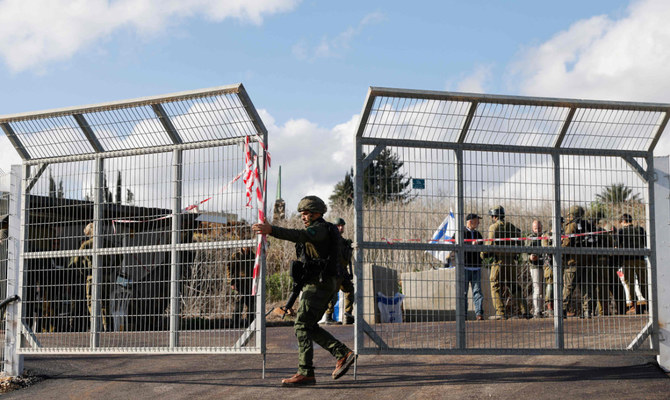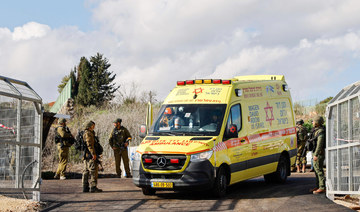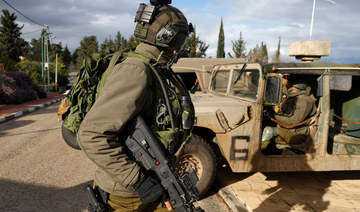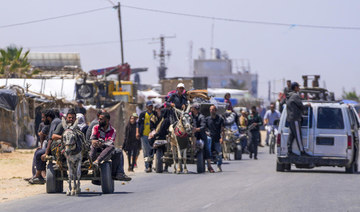BEIRUT: Fighting in southern Lebanon between the Israeli army and Hezbollah entered its 100th day on Monday with no prospect of an end in sight any time soon.
Despite diplomatic efforts in recent weeks, Lebanese officials unanimously stated that halting the hostilities on the southern Lebanese front is dependent on Israel ending its war in the Gaza Strip.
“100 days of tit-for-tat operations by land and air on the southern border has resulted in significant damage and destruction, mainly in Lebanese border villages, and paralyzed the economy,” one observer told Arab News.
“Displacement does not only affect thousands of Lebanese residing in these villages but also hundreds of thousands of Israelis who left their settlements for the first time in the history of the conflict on the Lebanese front.”
The Israeli Public Broadcasting Corporation said on Monday that the Israeli army bombed parts of southern Lebanon from which rockets had been launched toward the village of Mattat in Upper Galilee.
Sirens sounded in Kiryat Shmona, in the Galilee panhandle, where Hezbollah said it carried out a series of attacks on Israeli military sites, including “the Metula outpost, the Dhahira outpost, the Baraka outpost, and a gathering of Israeli soldiers in the outskirts of the Mattat outpost.”
Israeli shelling reached the outskirts of the border villages of Aytaroun, Odaisseh, Rab Al-Thalathin, Kfarkila, Rachaya Al-Fakhar and Kfarhamam.
According to Israeli army spokesperson Avichay Adraee, attacks by Hezbollah on Sunday night on the Kfar Yuval settlement killed a 48-year-old man, who was a member of the security alert teams in Galilee, and his 72-year-old mother.
Meanwhile, an Israeli tank reportedly fired on empty civilian houses in the border village of Al-Abbasiyyeh, and the Israeli army raided the village of Yaroun in the Bint Jbeil district. Army forces were accused of violating the rules of engagement on Sunday when they launched two missiles that landed in a valley between Seddiqine and Rechknanay in Tyre.
Israeli forces also carried out raids in the outskirts of Jabal Al-Rihan, Jabal Safi, and the outskirts of the villages of Sejoud and Mlikh. These areas are located north of the Litani River, far from the conflict zone. As a result of the attacks, Jabal Al-Rihan, Jezzine and other nearby villages experienced power outages. Hezbollah said one of its fighters, Ali Hussein Hamdan from the village of Harouf, was killed.
It was the fifth time Israeli warplanes have targeted Jabal Al-Safi and the surrounding area, which Israel considers a key region for Hezbollah, and the group’s third line of defense. It is said to contain several Hezbollah bases, outposts and weapons depots.
The observer said that during the past 100 days, both sides in the conflict have violated the rules of engagement that have been in place in southern Lebanon for 17 years.
“Advanced Israeli military technology allowed the Israeli army to record more than one violation, the most egregious of which was targeting the southern Beirut suburb to assassinate Hamas military official Saleh Al-Arouri,” he said.
“Hezbollah’s operations affected areas somewhat far from the border area, such as the Safad base and the Kiryat Shmona settlement.
“Therefore, neither party can accuse the other of having modified the rules of engagement to its advantage because both parties recorded more than one violation, and this matter will be reflected after the end of the war, as things will not return to what they used to be. The rules of the game will change.”
In a speech on Sunday, Hezbollah Secretary-General Hassan Nasrallah reaffirmed that “all the Israeli threats that the US side conveys to Lebanon will be of no use in dissuading the (Lebanese) resistance from supporting the Palestinian resistance.”
He reiterated that the only development that will halt Hezbollah’s operations is a ceasefire in Gaza.
He added: “Any hope to recover prisoners held by the resistance in the Gaza Strip has ended. Stopping the war on Gaza alone will stop the work of all support fronts.”
According to a source in southern Lebanon, both sides have adopted an aggressive tone and rhetoric that surpasses even the military escalation on the ground.
Israel has “utilized advanced technology to compensate for the damage caused by Hezbollah to their spy equipment. Hezbollah, meanwhile, has relied on long-range weapons such as the Burkan and modified Kornet missiles,” the source said, adding that the Israeli army controls the air while Hezbollah is dominant on the ground.
“Additionally, Hezbollah has reported more than 145 fighters lost in the recent attacks while on an offensive position,” the source said. “But there were 245 casualties during the 2006 Israeli aggression when Hezbollah was in a defensive position.”
Referring to bad feelings locally about the UN Interim Force in Lebanon, the source added: “There is Lebanese anger against UNIFIL forces currently because they only write reports and sometimes turn into a spy for the benefit of Israel, as happened in the 1996 and 2006 Israeli aggressions.
“But UNIFIL’s relationship with the local community will soon be restored because no one wants to break the relationship with the international forces.”
Meanwhile, the source said, the Israeli army “accuses UNIFIL forces of not exercising their role and says that their area of operations contains weapons, which goes against the agreements made 17 years ago. The current confrontations also show that UNIFIL forces are subjected to Israeli resentment that has reached the point of cutting off communications with these forces for some time.”
























